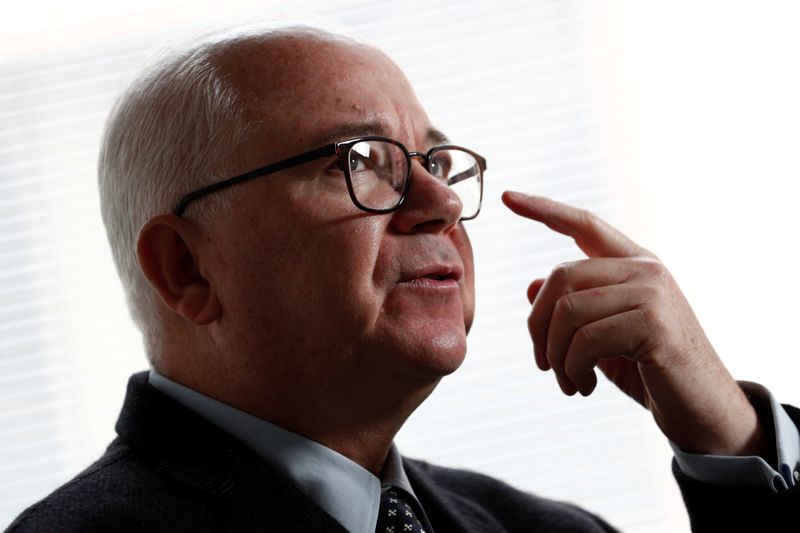
FOX Business’ Charles Gasparino discusses the SEC investigation into Citadel and GTS over direct listings and the Tesla stock price reaching the $420 mark.
At the recent Fixed Income Market Structure Advisory Committee (FIMSAC), Securities and Exchange Commission (SEC) Chairman Jay Clayton expressed interest in exploring whether alternative payment models were warranted to address concerns that “ratings shopping” by issuers had led to higher credit ratings than were actually deserved.
Continue Reading Below
Since the 2008 Recession, the SEC has become the skilled regulator of credit rating agencies (CRAs), enforcing strict guardrails against conflicts of interest and it has the authority to address inflated ratings if they occur.
WEWORK SCRAMBLED TO ANSWER SEC QUESTIONS BEFORE FAILED IPO: REPORT
I hope the chairman’s exploration of alternative models was a modest and diplomatic gesture, given that he understands how effectively the SEC oversees the CRAs.
Nonetheless, that FIMSAC meeting included a serious discussion of a previously debunked idea for an alternative payment model that would impose a tax on structured debt offerings.
The tax would fund a new government board and staff, that presumably would be more virtuous in deciding credit quality than would private sector professionals.
This government board would select the winning CRA for each future structured debt offering and be the sole payer for ratings. And, VOILA! Through this government engineering, no more ratings shopping would ever occur because the issuer would neither directly pay nor select the CRA.
As a former SEC Commissioner, the above discussion is akin to hearing fingernails scratching a chalkboard.
The question of the ratings agency business model has been previously asked and answered. It is important to remember that additional regulation is never a cure-all.
Potential conflicts inherent in credit ratings are not unique and certainly are not the only conflicts that occur regularly in the markets.
There is clearly a moral hazard inherent in a potential system of new government-supervised ratings. After all, bureaucrats are not perfect. Such a system would not necessarily be preferable to dealing with the existing CRA conflicts of interests through today’s careful supervision by the SEC, where investors pay for ratings that affect their portfolio values.
To date, the SEC’s examinations indicate that CRAs are managing potential conflicts and producing appropriate ratings that benefit investors, issuers, and other stakeholders.
Regulators need to respect the mechanisms that the markets have established that are working and intervene only when absolutely necessary.
Where conflicts raise the potential for taking advantage of investors, stronger and dedicated oversight and monitoring through existing agency structures may be necessary and are always preferable to a new experimental government intervention.
Neither Congress nor the SEC should mandate a radical change in the proven business models of market participants.
Certainly, memories are long and there is plenty of blame to assign to CRAs for their role in the Great Recession. In response to that blame, a slew of new regulations and corrective measures were enacted through Dodd-Frank and other policies. The SEC is now playing the critical and effective role in guarding against ratings shopping and other ratings concerns.
Strict firewalls between the commercial and analytical sides of credit ratings firms are now in place to ensure credit analysis is not influenced by business considerations. Credit ratings analysts are prohibited from involvement in commercial activities and commercial-side employees are barred from the management of ratings criteria. Indeed, compliance officers must often be present in those limited circumstances when the two sides even talk to one another.
A dedicated Office of Credit Ratings (OCR) at the SEC was also established to oversee the CRA industry—conducting annual inspections, publishing reports with its findings, and generating enforcement actions where violations are found.
Anyone who has looked at the SEC’s annual reports can see the SEC is performing robust examinations and holding these firms accountable.
CLICK HERE TO GET FOX BUSINESS ON THE GO
To date, the SEC’s examinations indicate that CRAs are managing potential conflicts and producing appropriate ratings that benefit investors, issuers, and other stakeholders.
The SEC is now a mature regulator of the credit ratings industry. It is absolutely appropriate to consider lessons learned and how we can continue to improve oversight and enhance competition.
If the SEC is concerned about the ratings process, it would be proper for the agency to prioritize a review of the effectiveness of its current oversight and to assure that sufficient resources are made available to the OCR and its examination system.
It is not the time, however, for an untested government-engineered credit ratings market. The credit markets and the resulting information to investors is too important for laboratory experiments.
Former SEC commissioner Roel Campos is a partner at the international law firm of Hughes Hubbard & Reed, whose clients include financial institutions and rating agencies. The views and opinions expressed are those of the author and do not necessarily reflect the views of the firm or its clients.


